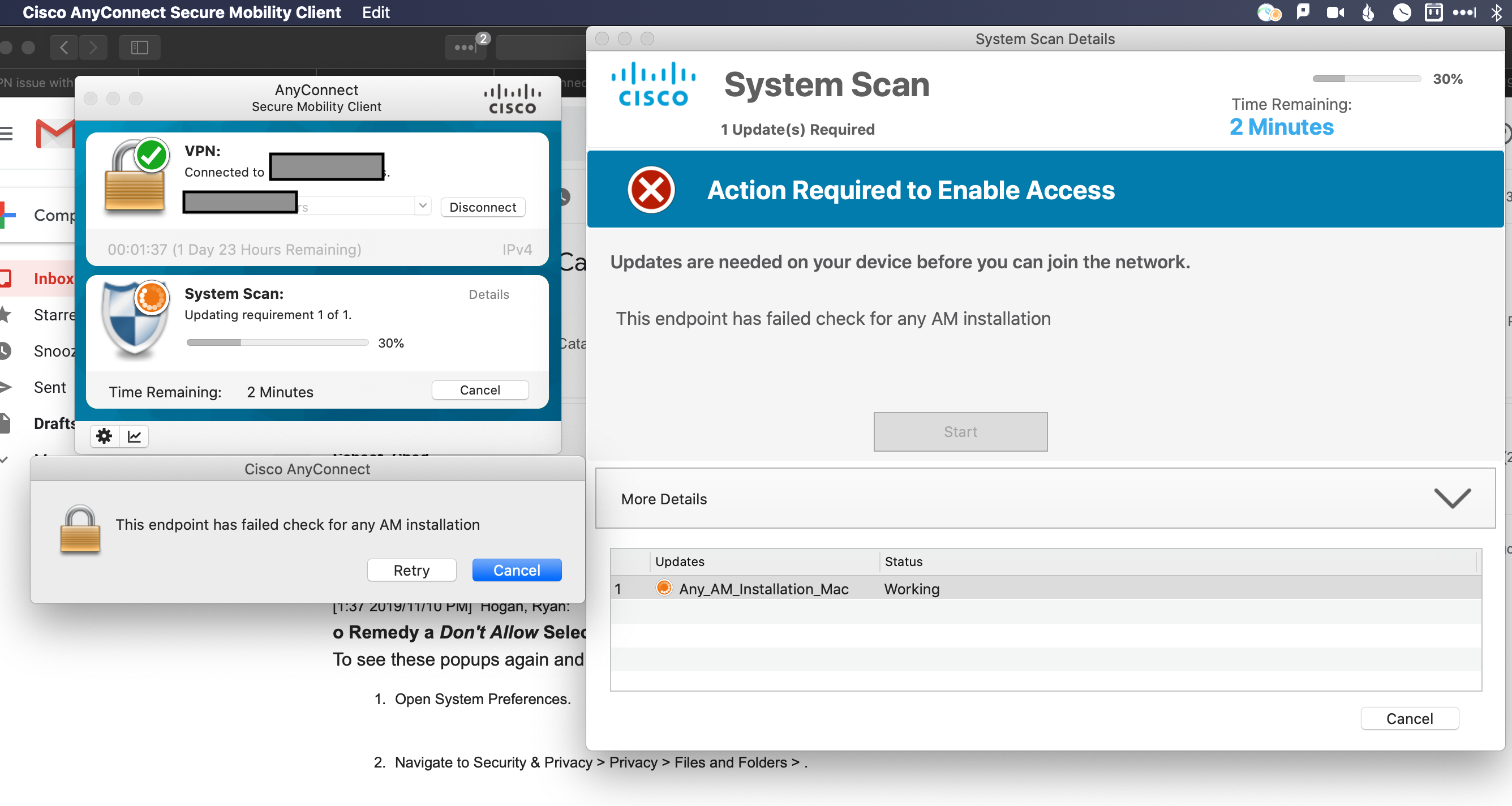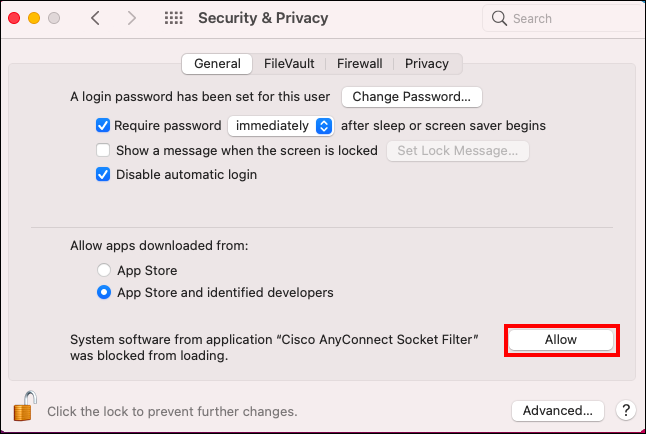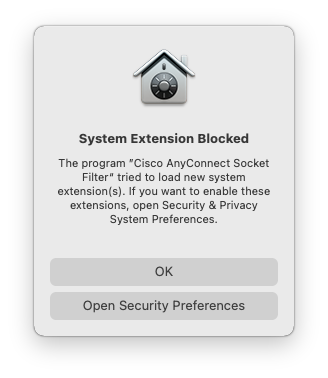University Systems has a responsibility to provide secure and reliable technology to our community and as such keeps up with the ever-changing technology environment. This includes the deployment of additional technologies and supporting our community to work and learn remotely, while also adapting to changes such as the introduction of new technologies that are not immediately compatible with our environment.

Apple introduced both a new operating system (Big Sur/macOS 11) and a new computer processor (M1/Apple Silicon) late last year and University Systems ordered them as soon as they were available so we could begin testing them to ensure that they would work with the software our community relies on for teaching and research.
Catalina and Big Sur issue with VPN So after the Catalina 19H15 update users are no longer able to use cisco anyconnect vpn which is on the 4.9 version. They were able to do this the day before but now non can. This AnyConnect 4.9.04043 release introduces support for macOS 11.x (Big Sur) and compatibility with devices running Apple Silicon. Don't stop after you've improved your network! Improve the world by lending money to the working poor.
Appendix: AnyConnect Changes Related to macOS 11 (Big Sur) You must be running AnyConnect 4.9.04xxx (or later) for macOS 11. It leverages the System Extension framework available in macOS, while it formerly used the now-deprecated Kernel Extension framework. Previous versions of the AnyConnect VPN client may not function under Big Sur. Version 4.9.03047 is required for full functionality after upgrading. The AnyConnect client will update to the latest version automatically when connecting to the WCM VPN.
A thorough test and review of the current version of Big Sur and the new M1 Macs has been performed.
While most core software used at UVic has versions available that are compatible with Big Sur, other software may not yet be compatible and either won’t install or run, or is not officially supported by the vendor. Each software vendor has offered different timelines for compatible versions and we are testing these versions as they are released. All of this information is documented in this bulletin, which we published in November and keep updated.
UVic specific applications and services have been tested with Big Sur and M1 Macs, and their compatibility with this new operating system and new hardware has been itemized below.
M1/Apple Silicon
Apple has started to ship Mac Minis, MacBook Airs and the 13” MacBook Pro with the new Apple M1 Chip, also called “Apple Silicon”. These Macs can only run Big Sur. Note that Intel base Mac hardware is still available from Apple for the foreseeable future.
From our testing and reports from the wider Mac community, including other educational institutions, M1 Macs have the following concerns:
- Our current antivirus software Symantec Endpoint Protection idoes not support M1 hardware at this time. Information on a new endpoint protection that is compatible with Big Sur and M1 hardware is available to IT support staff on campus, please contact helpdesk@uvic.ca.
- Many software vendors have not yet updated their applications to run natively on the M1 processor. While existing non-native applications may run under Apple’s translation process Rosetta 2, there may be functional or performance issues which the vendor might not provide support for.
- Macbooks with the M1 chip do not support having two external displays connected at the same time. One external display plus the built-in display is the maximum that is supported by the M1 chip. The M1 Mac Mini does not have this limitation.
At this time we are providing technical approval for purchases of M1/Apple Silicon Macs as long as customers are aware of the issues mentioned above.
More testing will be done when vendors supply updated versions of their applications and we will post an update to this bulletin.
Big Sur, macOS version 11
Big Sur (macOS version 11, hereafter referred to as Big Sur) is the latest release of the Apple operating system for Macintosh computers such as iMacs, MacBooks and Mac Pros. For more details on Big Sur see https://www.apple.com/macos/big-sur/.

Big Sur continues to use Apple File System (APFS) as the default file system, as introduced in macOS High Sierra (10.13)
If you are buying a new Macintosh it may come with Big Sur pre-installed. We recommend that you run Software Update to ensure you have any updates both for macOS but also for any Apple applications that may require an update to run under Big Sur.
You may rely on software that is not compatible with Big Sur. This will include any 32bit-only applications, which will be reliant on updates from vendors to 64-bit. This could include hardware drivers (printers, scanners, lab equipment, etc). If you're considering purchasing a new Apple Computer or upgrading to Big Sur, please take care to ensure the software you require can run on Big Sur.
Cisco Anyconnect For Big Sur
The following website is a crowdsourced library of programs that reports on compatibility with Big Sur, it may help inform whether a program you rely on is compatible with Big Sur: https://roaringapps.com/apps?platform=osx
The list of UVic-specific applications below have been reviewed and tested for compatibility with Big Sur. This list will be updated as we test any new versions that vendors release.
Cisco Anyconnect Secure Mobility Client (VPN)
Cisco AnyConnect is compatible and has been tested but is not compatible with the newest version of SEP that is supported in Big Sur.

IBM Spectrum Protect (Backup)
IBM Spectrum Protect (TSM) does not currently offer a version that is specifically compatible with Big Sur. The current version does install and launch but no further testing has been done.
iClicker (In-class polling)
iClicker 5.1.2 is compatible with Big Sur.
Symantec Endpoint Protection (Anti-virus)
Broadcom does not currently support a version of SEP that is compatible with Big Sur that doesn’t conflict with other UVic required software such as Anyconnect. There currently is no SEP version that is supported on M1 Macs. Information on a new endpoint protection that is compatible with Big Sur and M1 hardware is available to IT support staff on campus, please contact helpdesk@uvic.ca.
Adobe CC
Adobe CC is partially compatible and some apps have been tested. However Adobe lists some issues here: https://helpx.adobe.com/ca/download-install/kb/macos-big-sur.html and recommends not upgrading to Big Sur if you’re in the middle of a large project.
Printing
Current Ricoh print drivers are compatible and some have been tested with Big Sur. You may run into issues with older print drivers.
Kycoera does not currently support versions of their print drivers that are compatible with Big Sur.
In general usually very old printers will be incompatible or have reduced functionality on the newest operating systems.
Teams
Microsoft Teams is compatible and has been tested.
Zoom
Zoom is compatible and has been tested.
Microsoft Office
Microsoft Office 2019 is compatible and has been tested.
Safari 14
These UVic services have all been tested and work successfully in Safari 14 in Big Sur:
- Banner
- Connect
- Online tools
- Brightspace
- CourseSpaces
- OAC
- Cascade
- FAST
Mac Os Big Sur Cisco Anyconnect
*Please note that the Optimized Storage feature in Big Sur may transfer sensitive or confidential materials from your hard drive to iCloud. University Systems strongly recommends that any faculty and staff upgrading to Big Sur disable Optimized Storage and refrain from using iCloud to store any university data as the data may not be stored in compliance with privacy legislation and university policy.
Updating your Mac
If you have technical support through Desktop Support Services (DSS), in your department, or through the Computer Help Desk, please contact them to arrange your upgrade.

If you are planning to update your existing Mac to Big Sur yourself you should follow Apple’s recommended process: https://www.apple.com/macos/how-to-upgrade/
It is especially important that you back up your Mac prior to upgrading to avoid data loss in case the upgrade fails.
Questions about Big Sur?
If you have any questions about Big Sur or the M1 Macs, please contact the Computer Help Desk or your Desktop Support Services contact for additional information. We will continue to update this bulletin as we test additional features and compatibility with Big Sur and the M1 Macs.
NOTE: If you have an FBRI-provided Mac, the Cisco Anyconnect Client is already installed. Please skip to Starting the VPN Client below.
Installing the VPN Client
- Download the AnyConnect VPN client for Mac OS X.
- In your Downloads folder, double-click the file you just downloaded to open it. An icon will appear on the desktop called AnyConnect, and a separate window will open.
- Double-click on AnyConnect.mpkg to run the installer, then follow the steps to complete the installation.
- When you see this screen, UN-check everything with the exception of VPN: (VPN option grayed out? Go here.)
- Starting with macOS 10.13 High Sierra: During the installation, you will be prompted to enable the AnyConnect software extension in the System Preferences -> Security & Privacy pane. The requirement to manually enable the software extension is an operating system requirement.
Starting the VPN Client

NOTE:The VPN will not connect if you are connected to the FBRI wired or wireless network.
- In your Applications folder, go to the Cisco folder and double-click the Cisco AnyConnect Secure Mobility Client.
- Enter vpn.vtc.vt.edu in the Ready toConnect to field, then press the Connect button.
- Enter your FBRI username and password, then click OK.
- A banner window will appear. Click Accept to close that window. You are now connected!
Disconnecting the VPN Client
When you are finished using the VPN, remember to disconnect (failing to disconnect can result in being unable to access resources if you are on-site at the Research Institute).
- Click the AnyConnect client icon located in the menu bar near the top right corner of your screen.
- Select Quit.
